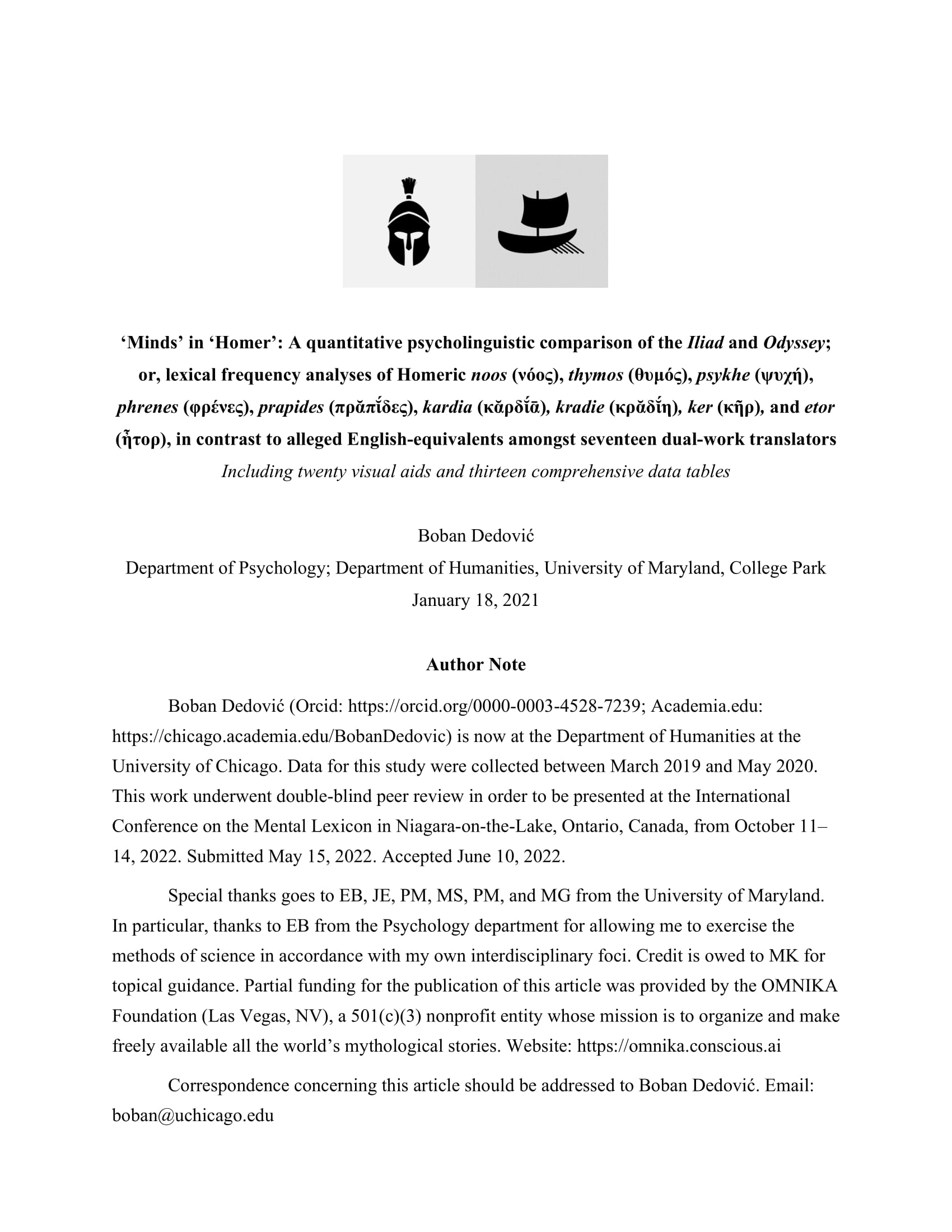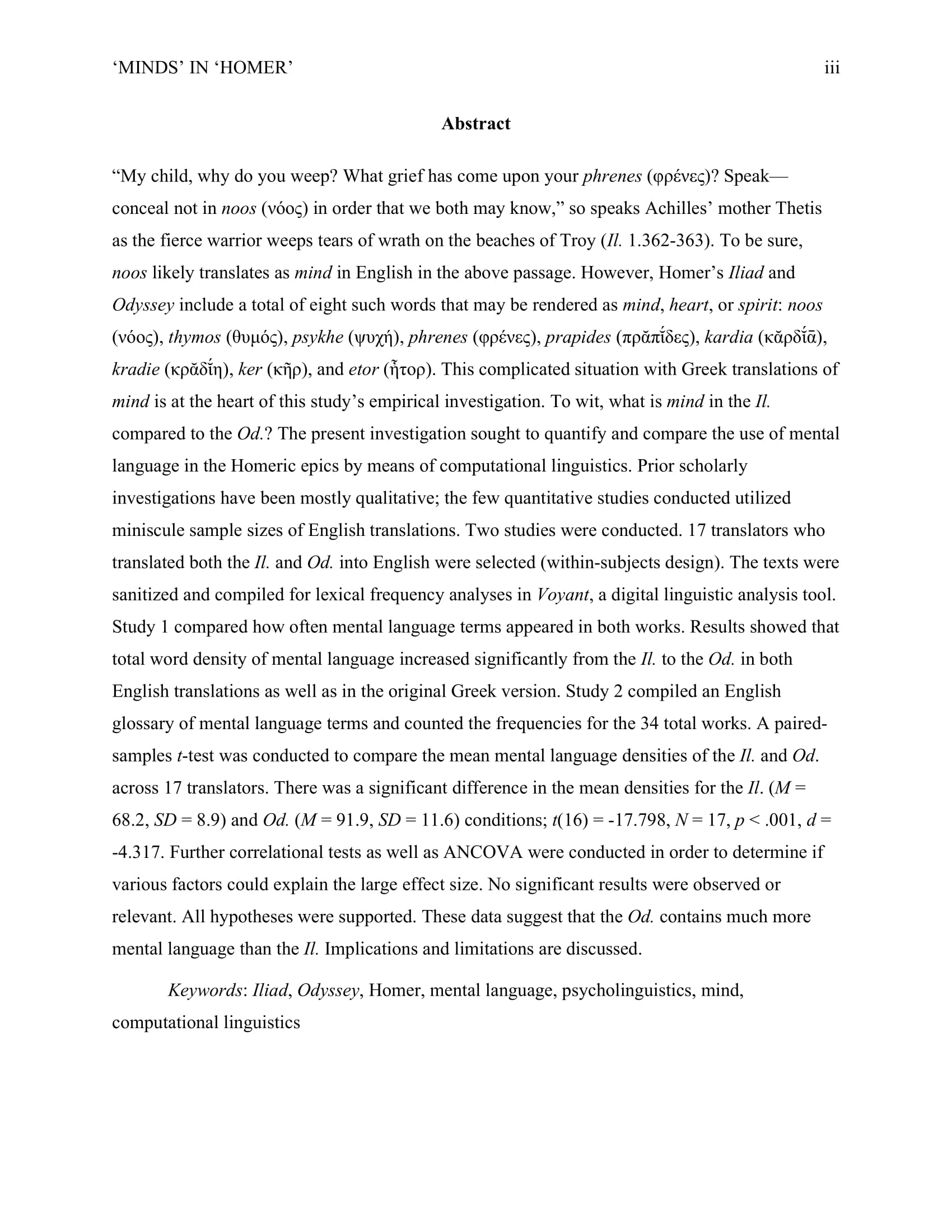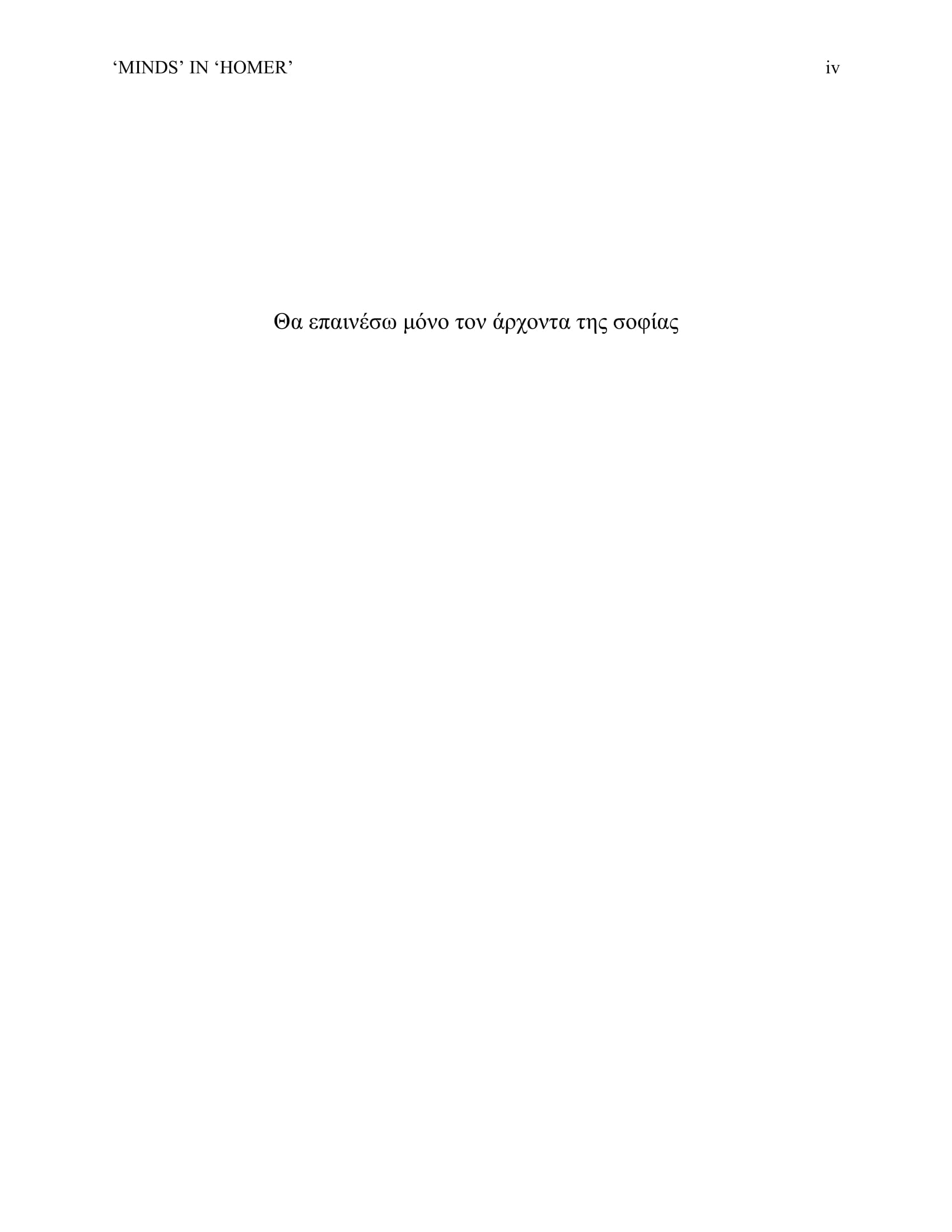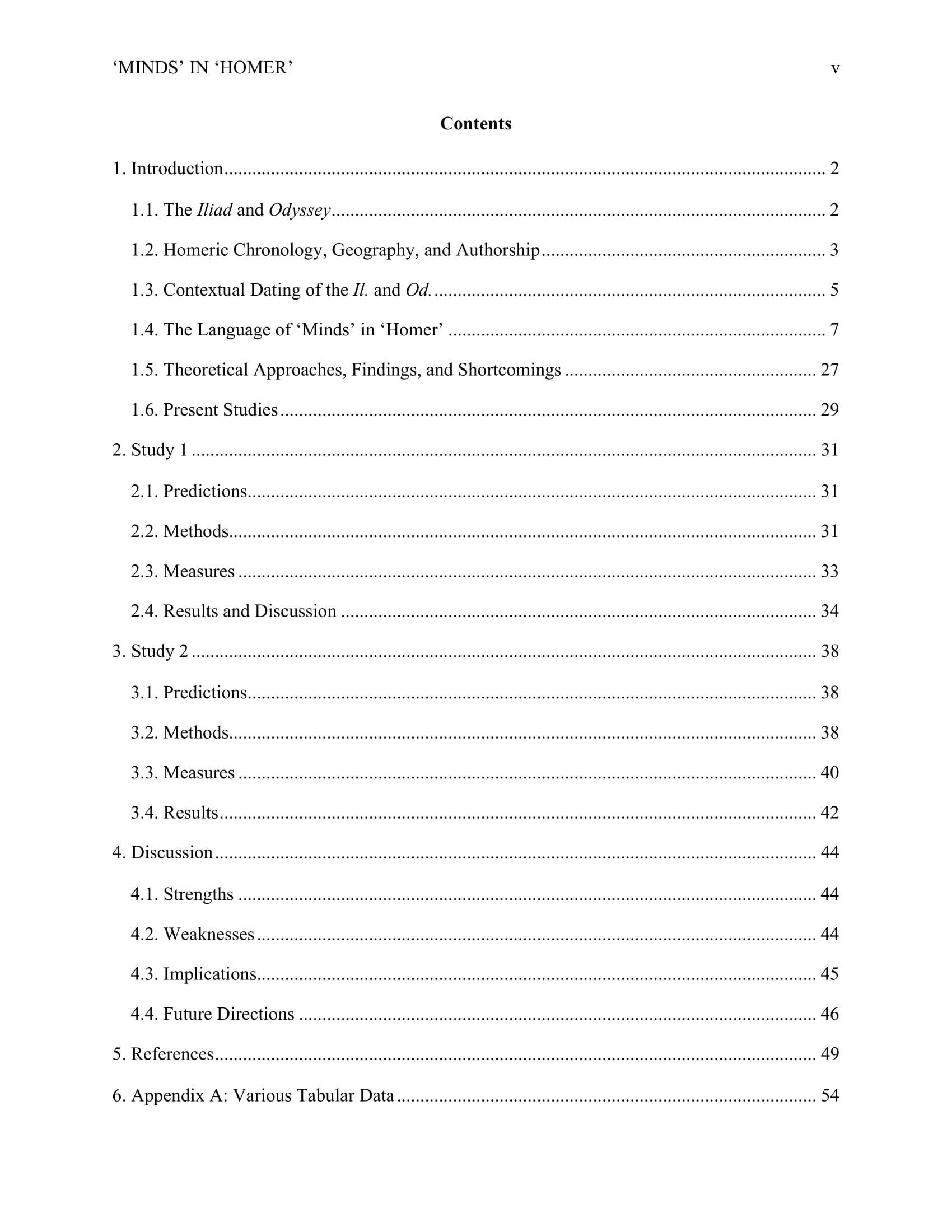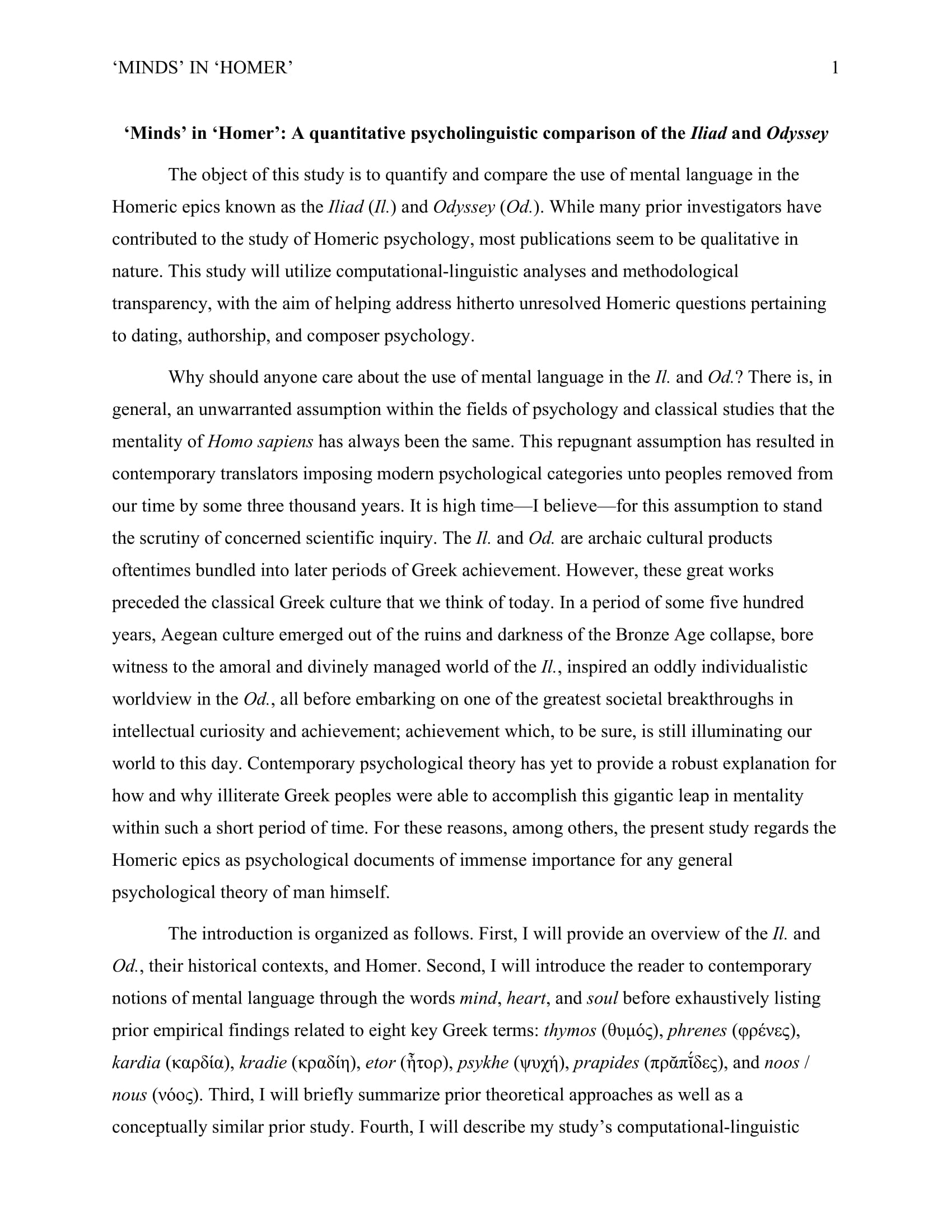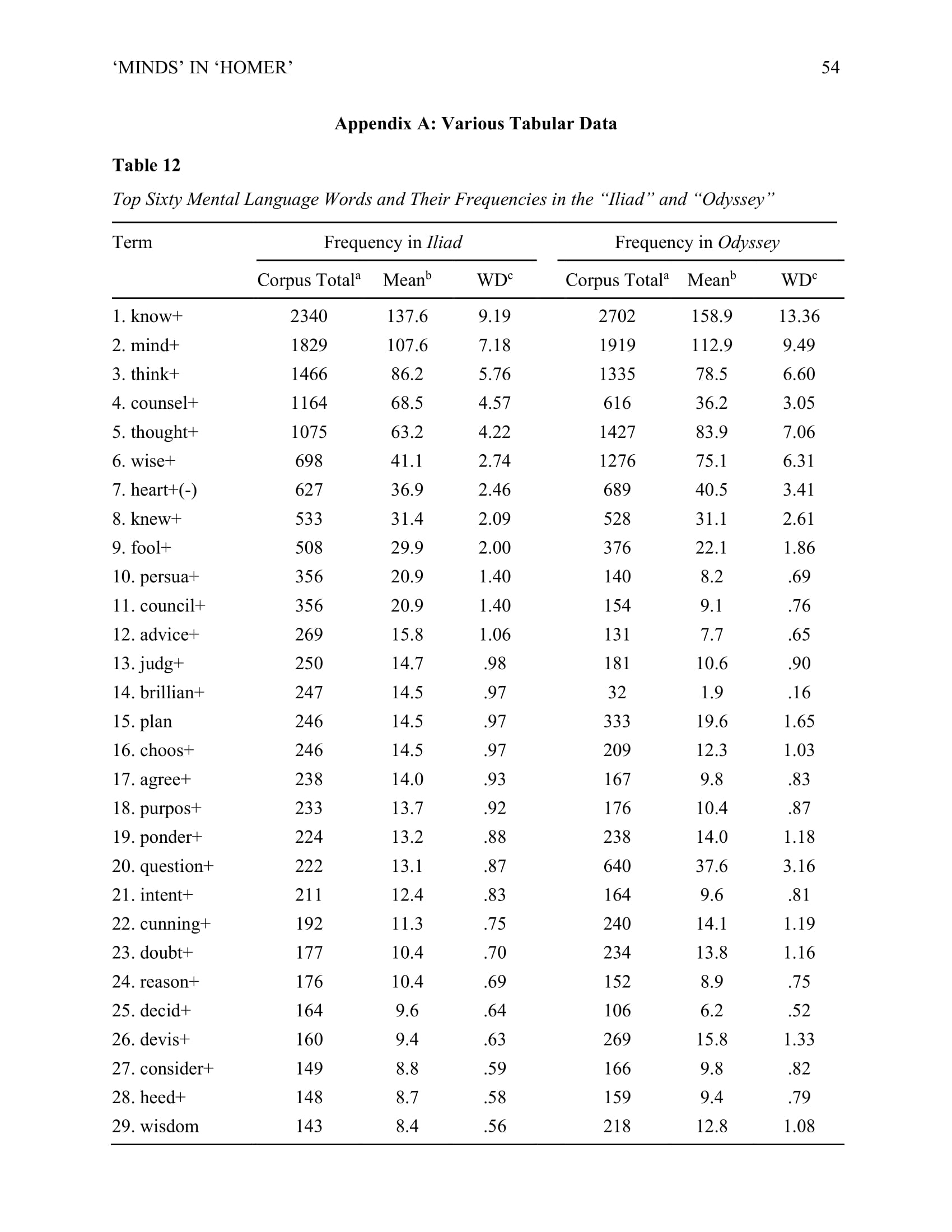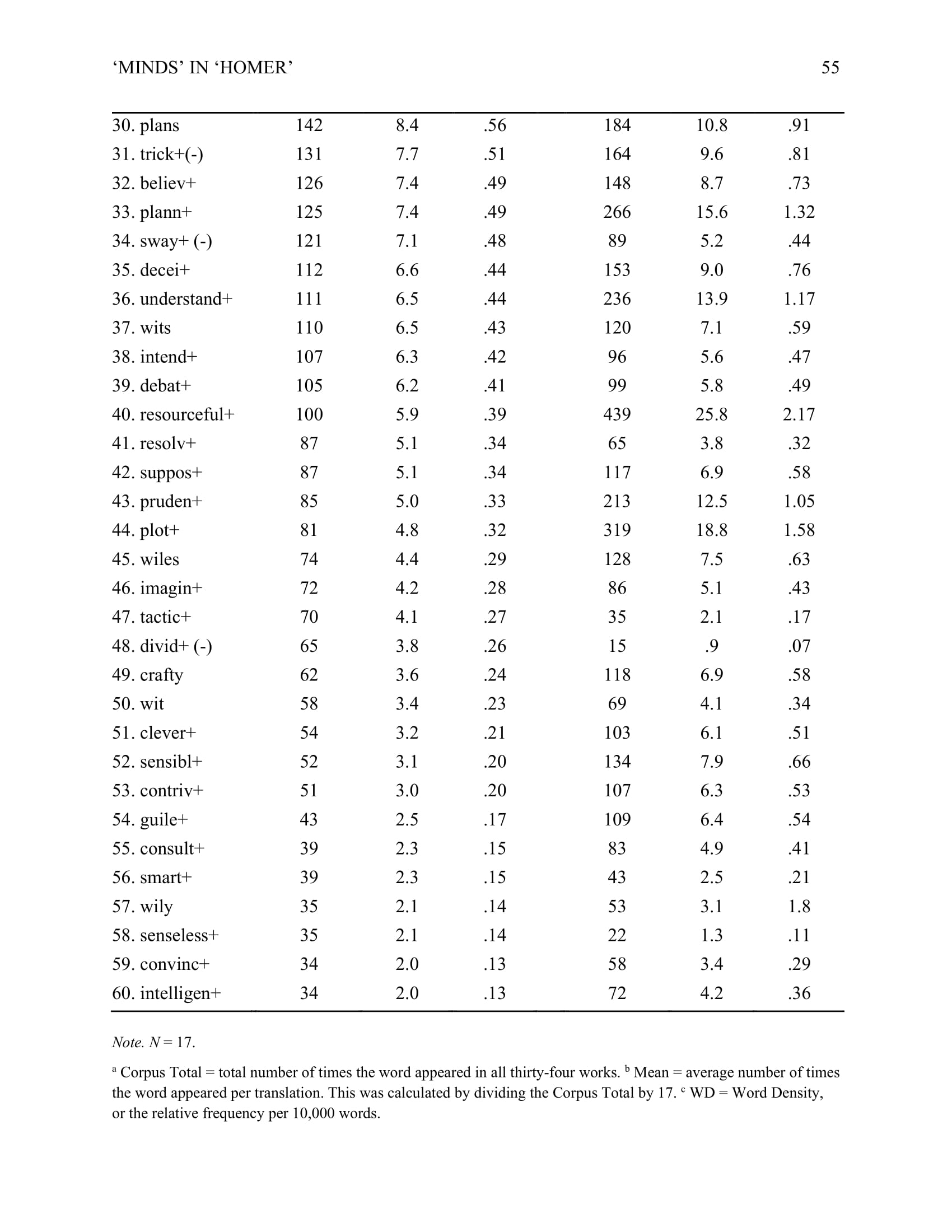About
"‘Minds’ in ‘Homer’" is a 2021 empirical research study on mental language in the Homeric epics which argued that the Iliad has much less mental language than the Odyssey, statistically speaking. Following peer review, the findings were accepted as a conference paper for the twelfth International Conference on the Mental Lexicon in Niagara-on-the-Lake, Ontario, Canada, from October 11–14, 2022.
Source: OMNIKA
Abstract: “My child, why do you weep? What grief has come upon your phrenes (φρένες)? Speak—conceal not in noos (νόος) in order that we both may know,” so speaks Achilles’ mother Thetis as the fierce warrior weeps tears of wrath on the beaches of Troy (Il. 1.362-363). To be sure, noos likely translates as mind in English in the above passage. However, Homer’s Iliad and Odyssey include a total of eight such words that may be rendered as mind, heart, or spirit: noos (νόος), thymos (θυμός), psykhe (ψυχή), phrenes (φρένες), prapides (πρᾰπῐ́δες), kardia (κᾰρδῐ́ᾱ), kradie (κρᾰδῐ́η), ker (κῆρ), and etor (ἦτορ). This complicated situation with Greek translations of mind is at the heart of this study’s empirical investigation. To wit, what is mind in the Il. compared to the Od.? The present investigation sought to quantify and compare the use of mental language in the Homeric epics by means of computational linguistics. Prior scholarly investigations have been mostly qualitative; the few quantitative studies conducted utilized miniscule sample sizes of English translations. Two studies were conducted. 17 translators who translated both the Il. and Od. into English were selected (within-subjects design). The texts were sanitized and compiled for lexical frequency analyses in Voyant, a digital linguistic analysis tool. Study 1 compared how often mental language terms appeared in both works. Results showed that total word density of mental language increased significantly from the Il. to the Od. in both English translations as well as in the original Greek version. Study 2 compiled an English glossary of mental language terms and counted the frequencies for the 34 total works. A paired-samples t-test was conducted to compare the mean mental language densities of the Il. and Od. across 17 translators. There was a significant difference in the mean densities for the Il. (M = 68.2, SD = 8.9) and Od. (M = 91.9, SD = 11.6) conditions; t(16) = -17.798, N = 17, p < .001, d = -4.317. Further correlational tests as well as ANCOVA were conducted in order to determine if various factors could explain the large effect size. No significant results were observed or relevant. All hypotheses were supported. These data suggest that the Od. contains much more mental language than the Il. Implications and limitations are discussed.
Source: Author or Publisher
expand_more Read more Read less
Access
Read for free
External sources
Primary
Myth
Achilles, half man-half deity, fought in the Trojan war for King Agamemnon and quarreled with him over a mistress, among other things. The war featured the Trojans against the Greeks and had lots of action where Achilles was the star. Achilles' close friend Patroclus died at the hands of Hector; consequently, Achilles slaughtered him in order to get his revenge. While not listed in the Iliad, sources say that Achilles suffered his tragic fate at the end of the war by Paris when he was shot with an arrow through the achilles heel. Achilles fulfilled the hero motif of living a short life of glory.
Belief system

The ancient Greek belief system represents a collection of cultural myths and stories that date back to circa 1300-1200 BCE. Its pantheon of deities were widely known and written about in Greek texts. The Romans...
Deity
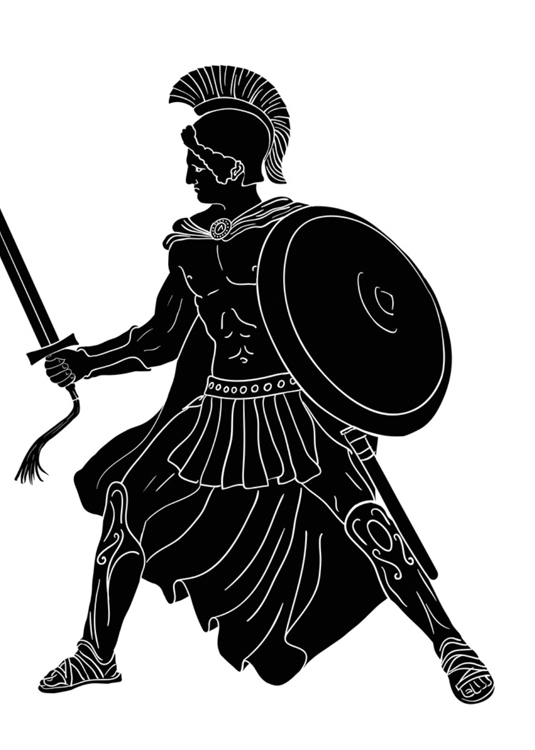
Achilles (Greek: Ἀχιλλεύς) was a Trojan war hero who was half man, half deity. Achilles is best known for his fighting skills during the Trojan war where he slayed Hector.
Myths cited
Belief systems cited
It looks like only the main belief system was referenced in this work.
Other works
Conference paper · 2023
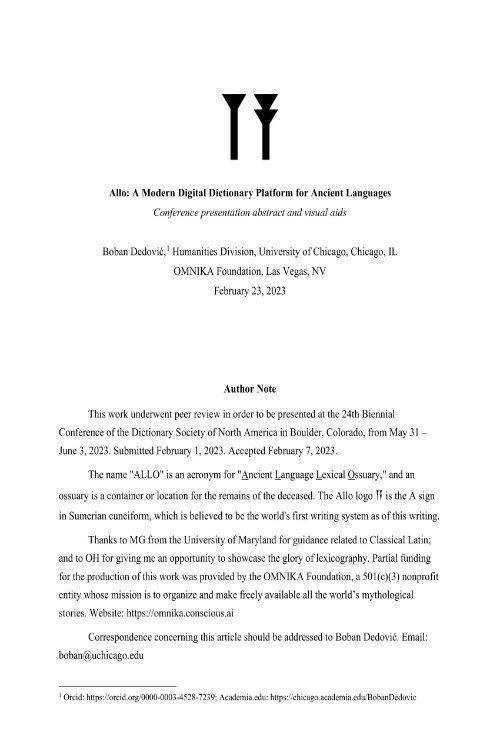
This work is a conference paper by Boban Dedović concerning Allo Latin, a digital tool first presented at the 24th biennial conference of the Dictionary Society of North America in Boulder, CO, May 31 – June 3, 2023.
Preprint · 2023
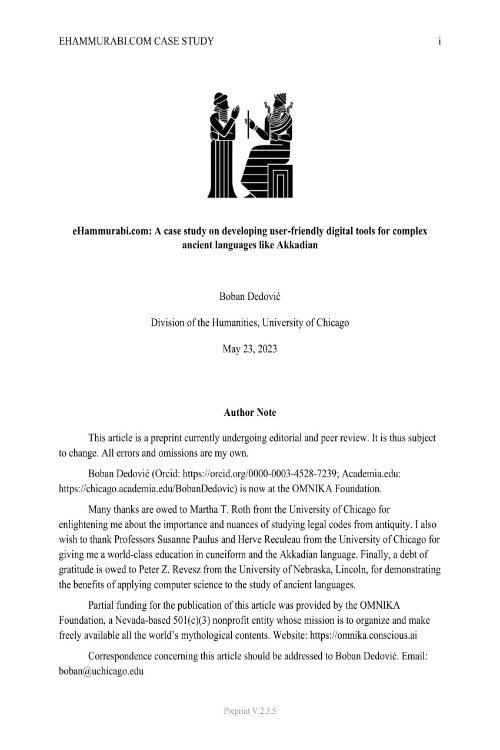
This case study outlines how the eHammurabi.com digital tool was built by describing its development from start to finish. The Law Code of Hammurabi was created in c. 1750 BCE and is well-known for being one of the oldest and most important legal texts in recorded human history.
Seminar paper · 2019
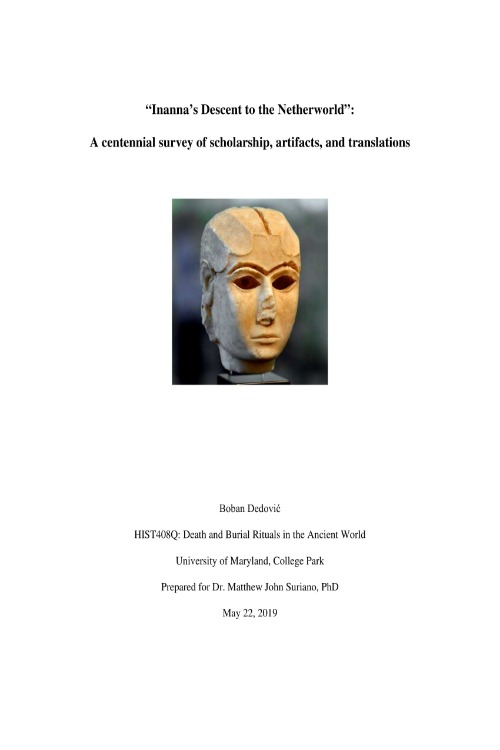
"Inanna's Descent" outlines all the scholarship related to the Sumerian afterlife myth named "Inanna's descent to the netherworld." The work contains a chronological survey of the scholarship, as well as an appendix of over forty artifact pictures and citation details. The work was produced by Dedović while he was studying death and burial rituals in the ancient world at the University of Maryland, College Park, MD.
Conference paper · 2022
"‘Minds’ in ‘Homer’" is a 2021 empirical research study on mental language in the Homeric epics which argued that the Iliad has much less mental language than the Odyssey, statistically speaking. Following peer review, the findings were accepted as a conference paper for the twelfth International Conference on the Mental Lexicon in Niagara-on-the-Lake, Ontario, Canada, from October 11–14, 2022.
Website · 1997
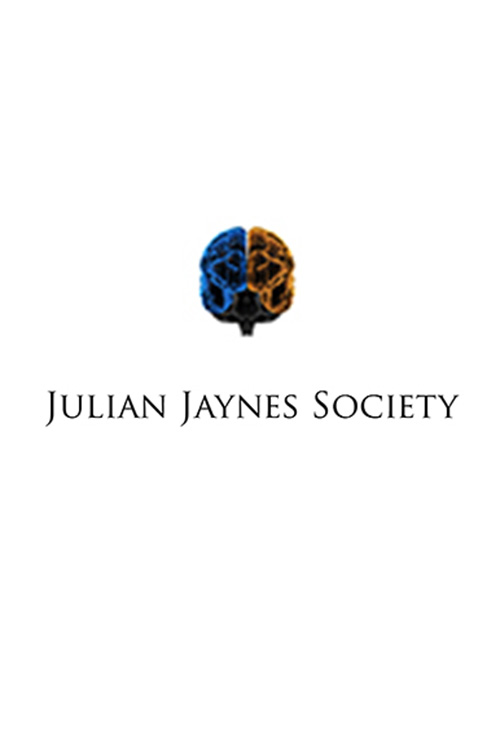
The "JJS" promotes the work of Julian Jaynes, a former Princeton professor who revolutionized ancient (and modern) psychology with his book, titled The Origin of Consciousness .... The book's contributions to ancient studies are legion, and cover the Homeric Epics (the Iliad and Odyssey), and more Greek and Akkadian myths. The society was started in 1997 by the prolific author Marcel Kuijsten, its Executive Director.
Website · 2021
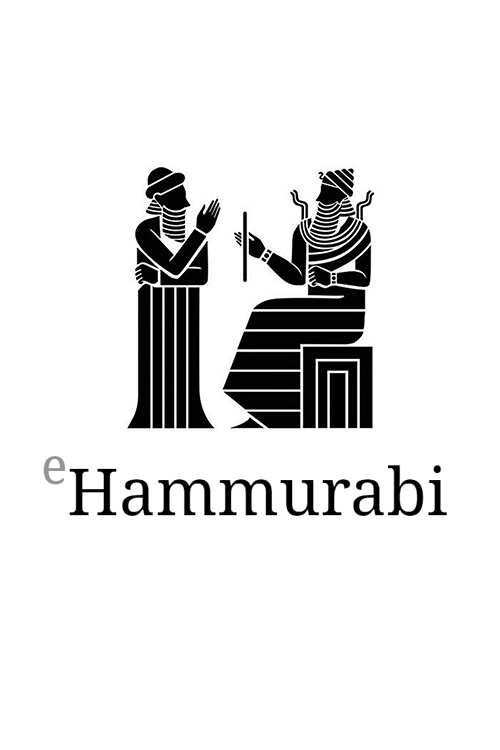
The Electronic Hammurbi website provides a digital version of the Law Code of Hammurabi; and includes the cuneiform signs, transliteration, normalization into Akkadian (Old Babylonian), and an English translation derived chiefly from Huehnergard's standard Akkadian grammar. The website was created by Boban Dedović on February 2021 while he was studying Mesopotamian Law at the University of Chicago, and is operated by the OMNIKA Foundation, a 501(c)(3) nonprofit based in Las Vegas, NV.
Conference paper · 2023
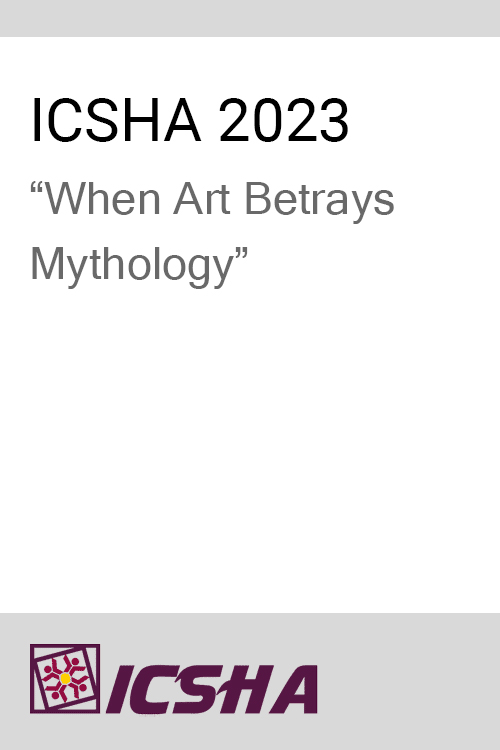
In "When Art Betrays Mythology," Dedović argued that Francisco Goya's Saturn painting is not representative of the mythological figure Cronus from Hesiod's Theogony. Instead, the author presents evidence to show that the painting's figure aligns with Grendel from Beowulf.
Book · 2022
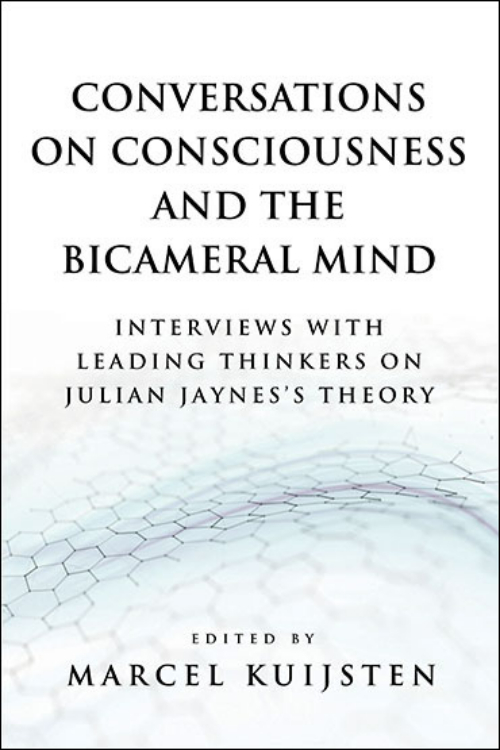
Conversations on Consciousness is a collection of transcribed interviews related to the theories of Julian Jaynes. The major focus of Jaynes' work was the origin of human consciousness. The work was compiled and edited by Marcel Kuijsten of the Julian Jaynes Society.
Library works
Book · 1889
Liddell and Scott's Intermediate Greek-English Lexicon is one of the world's most widely used ancient Greek to English dictionaries. It is an abridged version of an earlier publication in 1882. This version is often abbreviated as "LSJ" or the "Middle Liddell" because it is the "medium" sized version (by page count). It contains relevant entries for ancient authors and is widely used to the present day.
Book · 1976
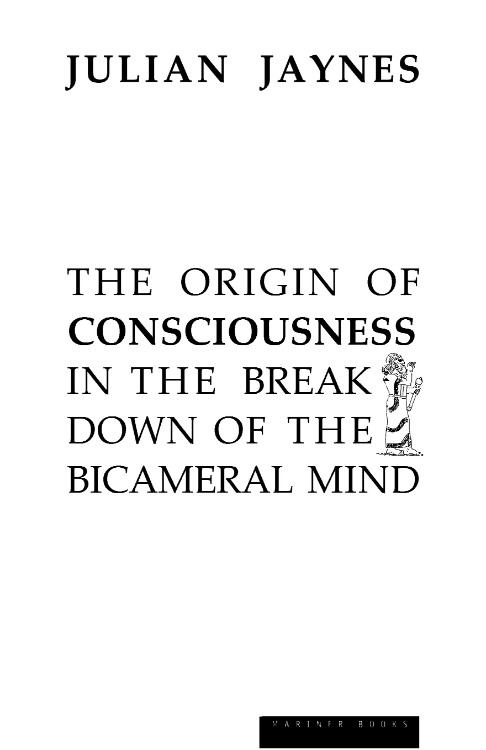
In his groundbreaking 1976 work, psychologist Julian Jaynes argued that as early as 1,000 BCE, man was not aware of himself. Instead, one side of his brain exhibited executive control through visual and auditory hallucinations during stressful situations. According to Jaynes, man thought that these were the voices of gods. As humans interacted with one another in difficult periods of migration, man became aware of himself and adopted the "bicameral voice" as his own, leaving man to wonder: why have the gods left us? The answer, according to the author, is that rational, subjective thought took the place of hallucinated voices.
Book · 1953
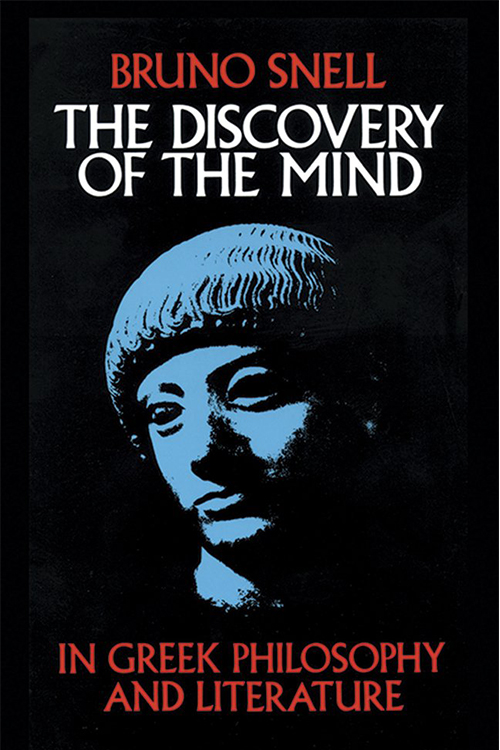
The Discovery of the Mind: The Greek Origins of European Thought is a 1946 book by Bruno Snell, a German classical philologist, that concerns Homeric epics. Snell's revolutionary thesis was that modern man, and his psychology, stem from the development of Greek intellectualism in the first one thousand years before the common era.
Book · 1951
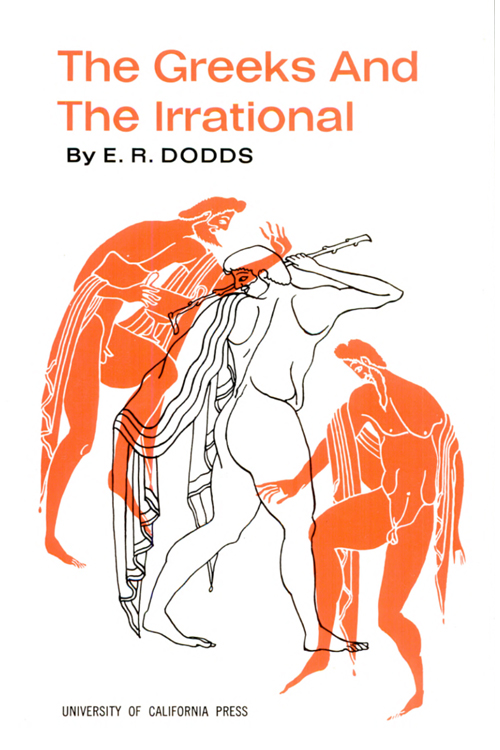
The Greeks and the Irrational is a 1951 book by Eric Robertson Dodds, an Irish classical scholar. The book challenged popular notions of the Greeks being wholly logical, citing a wide variety of cultural evidence. Dodds was a former Regius professor of Greek, and his book earned him praise for its novel analysis.
Contributor
Cite this work
ChicagoDedović, Boban. "‘Minds’ in ‘Homer’: A quantitative psycholinguistic comparison of the Iliad and Odyssey." Paper presented at the 12th International Conference on the Mental Lexicon, Niagara-on-the-Lake, Ontario, Canada, October 11–14, 2022. https://doi.org/10.31234/osf.io/uvqdc.

